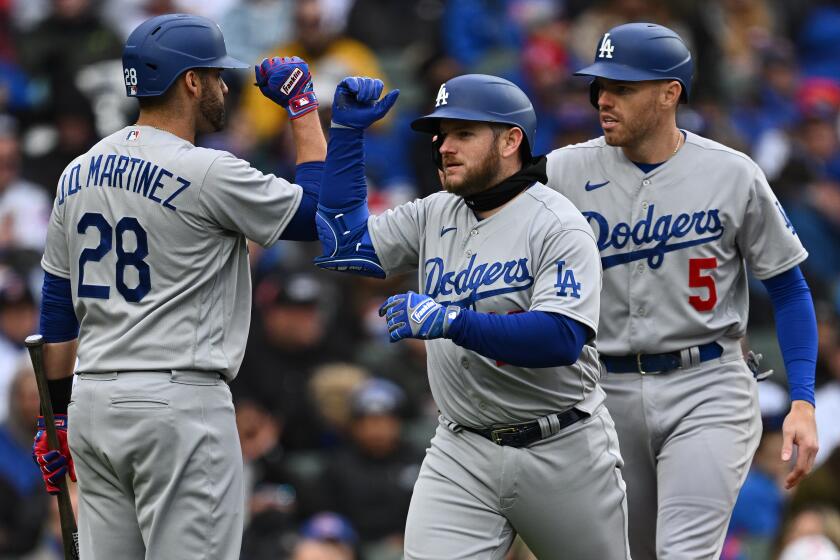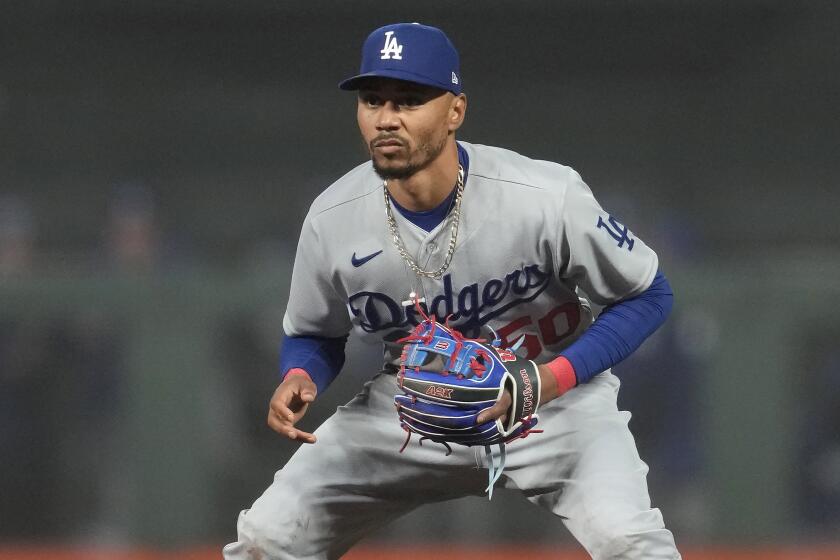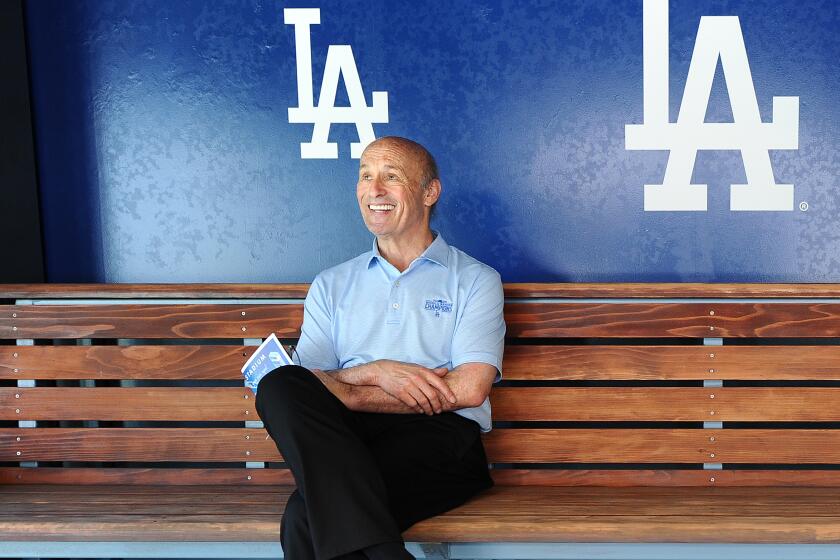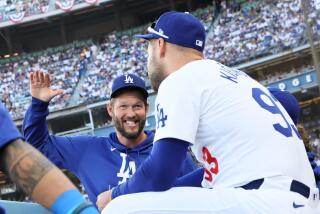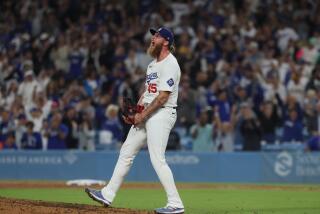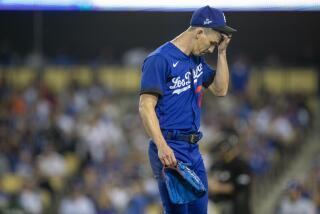‘Get in the moment.’ How Cubs career, Steve Bartman play shaped Mark Prior as Dodgers coach
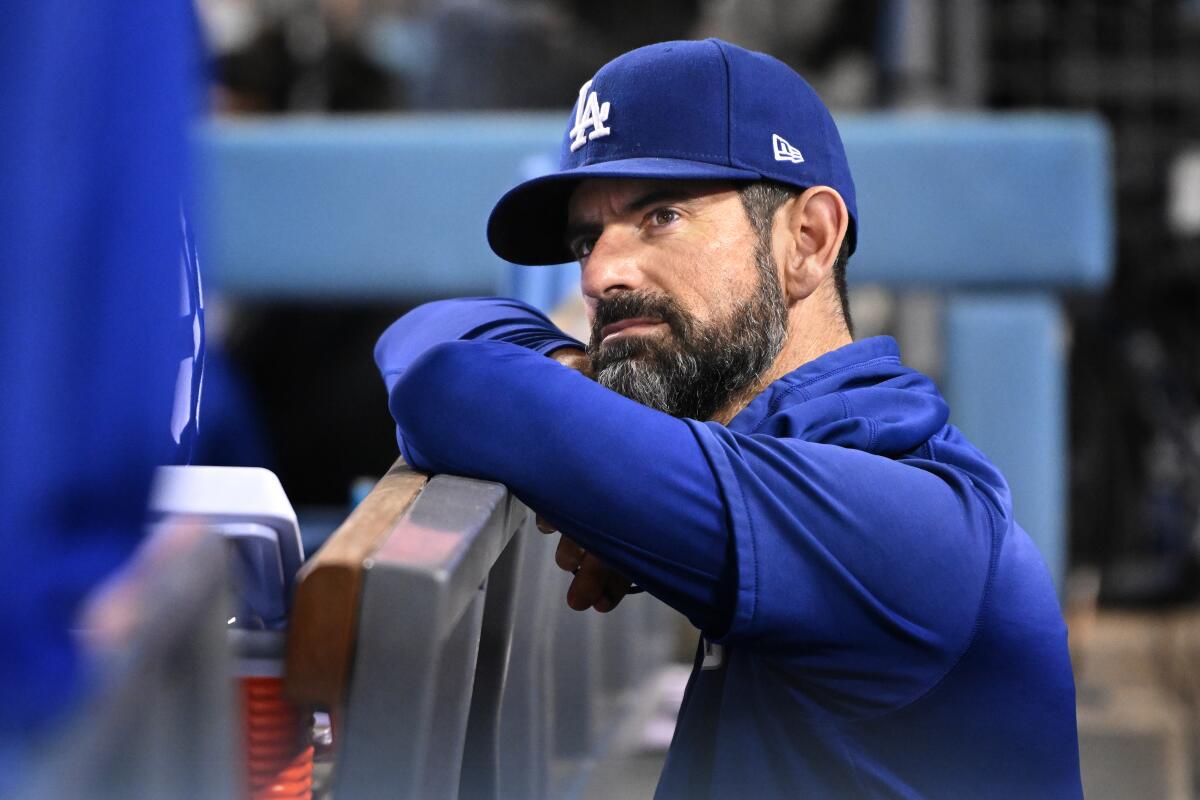
CHICAGO — The most famous camera shot is of Moisés Alou.
The Chicago Cubs outfielder runs to foul ground and leaps against a wall. He stretches his arm out, glove raised above his head. Then, he recoils in disgust, a flyout that could have helped the Cubs reach the World Series infamously bouncing off the arms of Steve Bartman instead.
It’s the next camera angle of Fox’s 2003 National League Championship Series broadcast, however, that tells another important piece of that story — one far more relevant to the Dodgers’ recent run of pitching excellence.
Up flashed a shot of Mark Prior — staring toward the outfield with a look of disbelief, struggling to digest what would soon become the most defining moment of his rollercoaster playing career.

“Sometimes those ripples can kind of snowball,” Prior said. “That one, obviously, is an extreme.”
Two decades later, Prior is in his fourth season as the Dodgers pitching coach, leading a staff that has achieved an almost unparalleled stretch of success on the mound.
Over the last three seasons, the Dodgers led the majors in team ERA, WHIP and Wins Above Replacement. And despite a slow start from Prior’s group this year — the team entered Monday ranked 18th with a 4.37 ERA over its first 23 games — the 42-year-old maintains a sterling reputation, combining advanced pitching acumen with a commanding, clear-minded presence.
“I think Mark is just tough, and I really respect that,” Dodgers ace and future Hall of Famer Clayton Kershaw said of Prior late last year. “Sometimes, it’s not easy to deliver a message to somebody that they don’t want to hear. But [he’ll tell us], ‘Quit being soft. Or go get this guy. Or you’re not throwing strikes. Or you’re not executing.’ Like, ‘I get you’re mad, but fix it.’ And I respect that so much.”
Home runs powered the Dodgers to a win over the Chicago Cubs on Sunday, but the team doesn’t seem concerned about its offense being too one dimensional.
Indeed, for a Dodgers team with a vast “run prevention department” — from assistant pitching coach and mechanics guru Connor McGuiness, to an analytics savant in bench coach Danny Lehmann, to a whole staff of other minor-league and front office voices — it is Prior’s background as a talented yet adversity-stricken player that has made him an effective conduit for the operation.
“I do feel like there’s a wide band of players that I could probably relate to,” he said. “The information now is so readily available. But so much of the nuances in the game, the little things — for guys who played for a long time, it’s the experiences [you use] to try to hopefully educate guys to get in the moment.”
“Getting in the moment” is something Prior couldn’t do on that fateful night at Wrigley Field in October 2003.
Just two years removed from being drafted second overall out of USC, the then 23-year-old was a Cy Young Award candidate and first-time All-Star on the verge of sending the Cubs to a long-awaited World Series.
“I think if anything, that just reinforced the value of each and every out, and how precious it is. It’s stuff we talk about with our pitchers. What that can do, how it can impact the game.”
— Dodgers pitching coach Mark Prior on an infamous play during the 2003 NLCS
Up 3-0 on the Florida Marlins in a potential clinching sixth game, Prior thought he might have induced a key second out in the eighth inning when Luis Castillo lifted a fly ball down the left-field line.
“The out wasn’t a given,” Prior noted.
But he never could have imagined what ultimately happened next.
Bartman — the headphone-wearing, turtlenecked Cubs fan soon villainized by Chicago for his oblivious front-row interference — prevented Alou from completing a leaping catch. And from there, everything spiraled.
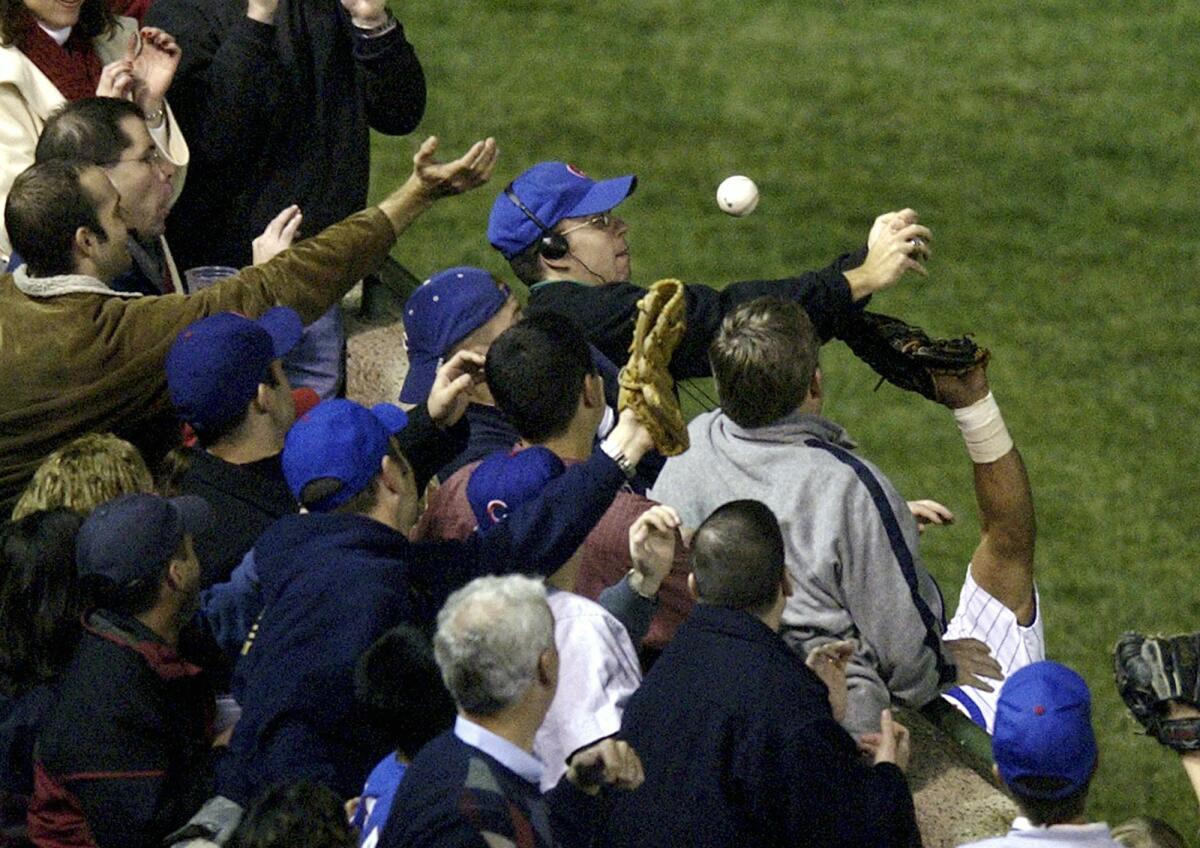
Prior walked Castillo in a full count on the next pitch. Ivan Rodriguez lined a two-strike RBI single after that. Shortstop Alex Gonzalez committed a costly error on a potential double-play ball. And after Derrek Lee ambushed Prior for a first-pitch double that tied the score, the lanky right-hander watched the rest of the inning from the dugout — an eight-run rally that flipped the game and the series.
“You go back and you watch the video,” Prior said last week as he and the Dodgers made their annual trip back to Wrigley Field, “it’s like, eight pitches later, nine pitches later, it’s a tied ball game, then they’re up by one, and I’m out of the game and things are just snowballing.”
“I think if anything, that just reinforced the value of each and every out, and how precious it is,” he added. “It’s stuff we talk about with our pitchers. What that can do, how it can impact the game.”
Prior recounts the sequence with regret rather than rage; having always blamed himself, and never Bartman, for a night after which his playing career was never the same.
The Dodgers have been experimenting with Mookie Betts at shortstop. Why that should be a long-term option for them.
Following his breakout 2003 campaign, when Prior navigated a heavy 211-inning workload with an 18-6 record and 2.43 ERA, injuries slowly derailed his final three seasons in the majors, going 18-17 with a 4.27 ERA the rest of the way.
He had elbow soreness and a hurt Achilles tendon in 2004, then more elbow troubles that limited him in 2005. In 2006, his shoulder began to ache. And the following year, he underwent reconstructive surgery to fix his labrum, capsule and rotator cuff — all but ending his time with the Cubs, and as a major leaguer, before his 27th birthday.
Despite that, Prior still treasures many parts of his playing days.
He reflects fondly of his experiences pitching at Wrigley Field, which he considered a “privilege to play in.”
He speaks highly of the older teammates he had in Chicago — from Greg Maddux and Kerry Wood, to Sammy Sosa, Aramis Ramirez and, of course, Alou — whom he leaned on heavily after being called up following just nine minor league games.
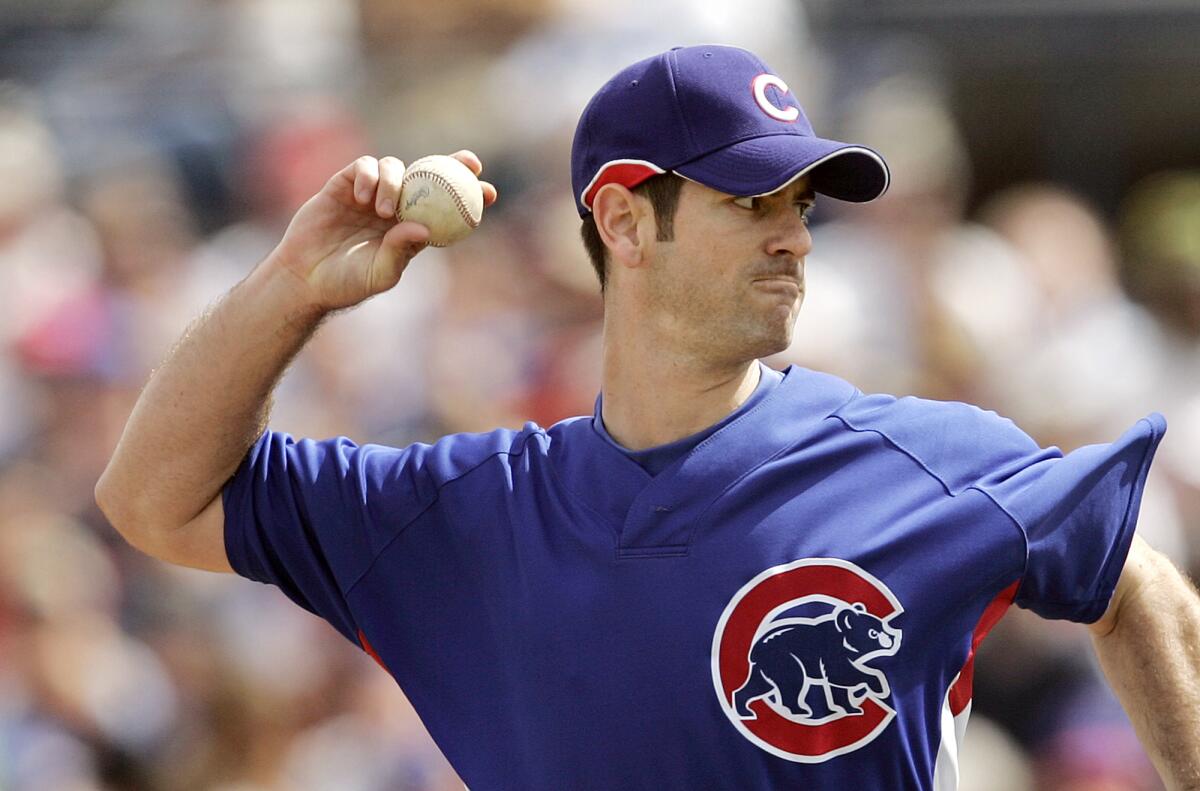
“I came up with a bunch of really good veterans that took pride in teaching younger players how to be professional, how to act, how to compete, how to manage games,” he said. “I didn’t have the minor league experiences of even being through a full season, what it’s like on your body, mentally and emotionally. So, a lot of those things, I think, helped from those guys.”
Those lessons were so impactful, it influenced Prior’s perspective during the latter half of his career, when he embraced his own veteran role during four seasons from 2010-2013 as a reliever in the minor leagues and, briefly, independent ball.
“I really enjoyed being down in the bullpen and being part of watching young guys come up and develop,” Prior said. “Being the older guy, I felt like it was kind of my obligation, the way I was treated as a younger person by some of my veterans, to pass on whatever information I could to help those guys.”
That’s when the principles of Prior’s coaching philosophy began to take shape, reapplying all he learned as a young major league phenom and through an older, wiser perspective.
Dodgers president Stan Kasten doesn’t see the need for the Dodgers to follow in the footsteps of the Mets and Padres when it comes to roster building.
He saw the importance of “clarity and conviction,” as he called it, “because if your mind is clouded out there, and you’re unsure, then it shows up in your execution.”
During Prior’s final professional season in 2013, when he made one last unsuccessful comeback attempt with the Cincinnati Reds, their pitching coordinator, Mark Riggins, reminded him how a more blunt, honest approach can work as well.
“It was [the end of spring and time to find out] whether or not I was gonna break camp with anybody,” Prior recalled. “He was flat out like, ‘We don’t know. We’ll let you know tomorrow.’ And I was like, well, I appreciated that versus sitting around for 12 hours.”
When more shoulder injuries ended his career that summer, Prior finally transitioned into an instructional role with the San Diego Padres, working in their front office for a couple of seasons before being named their minor league pitching coordinator in 2015.
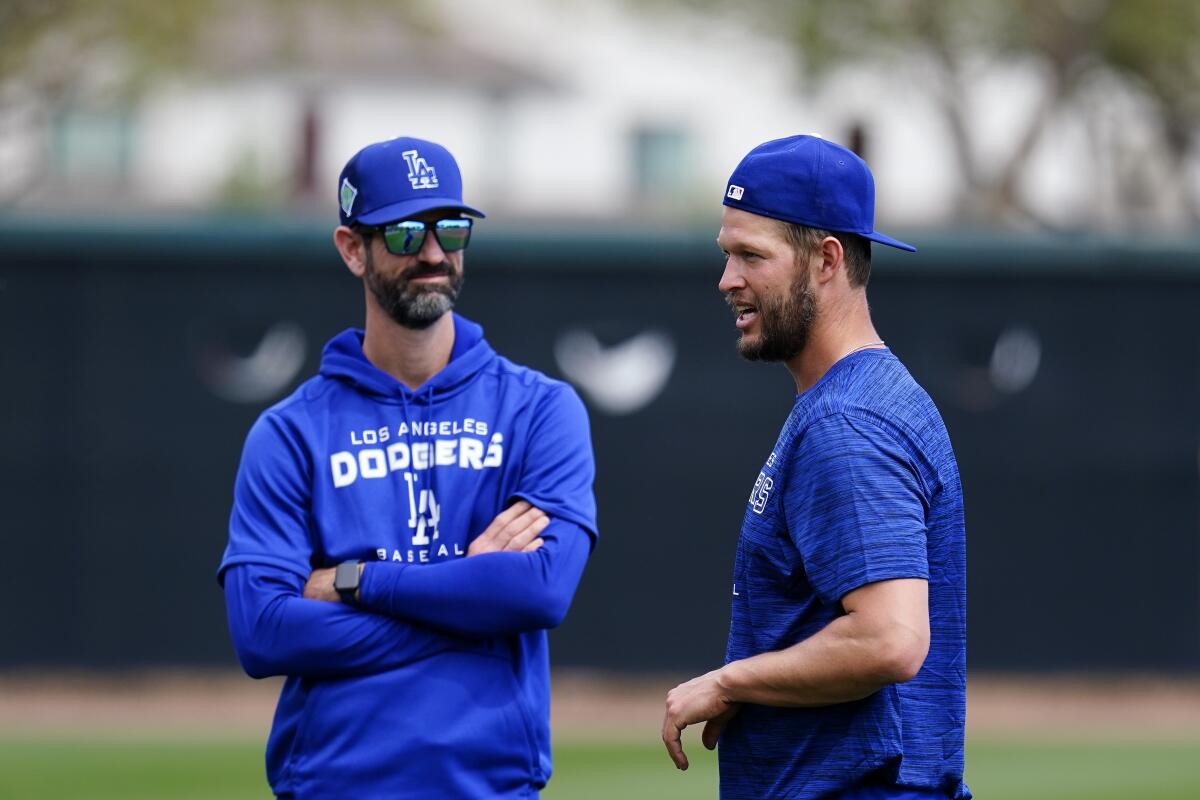
In 2018, the Dodgers hired Prior to be their bullpen coach. And when head pitching coach Rick Honeycutt retired two years later, Prior was promoted as his successor — bringing with him a wide array of highs and lows as a player that, even after all the injuries and setbacks and infamous postseason mistakes, he wouldn’t trade the experience.
“I think our job as coaches is to make this game as simple as possible,” he said. “And whether it’s being on the top-ish, or if it’s being hurt or being out of baseball, I do have a lot of experiences that I think can help me and at least push other people’s careers, hopefully, in a better direction.”
More to Read
Are you a true-blue fan?
Get our Dodgers Dugout newsletter for insights, news and much more.
You may occasionally receive promotional content from the Los Angeles Times.

